Jiadong Lou
Variational Autoencoder Framework for Hyperspectral Retrievals (Hyper-VAE) of Phytoplankton Absorption and Chlorophyll a in Coastal Waters for NASA's EMIT and PACE Missions
Apr 18, 2025



Abstract:Phytoplankton absorb and scatter light in unique ways, subtly altering the color of water, changes that are often minor for human eyes to detect but can be captured by sensitive ocean color instruments onboard satellites from space. Hyperspectral sensors, paired with advanced algorithms, are expected to significantly enhance the characterization of phytoplankton community composition, especially in coastal waters where ocean color remote sensing applications have historically encountered significant challenges. This study presents novel machine learning-based solutions for NASA's hyperspectral missions, including EMIT and PACE, tackling high-fidelity retrievals of phytoplankton absorption coefficient and chlorophyll a from their hyperspectral remote sensing reflectance. Given that a single Rrs spectrum may correspond to varied combinations of inherent optical properties and associated concentrations, the Variational Autoencoder (VAE) is used as a backbone in this study to handle such multi-distribution prediction problems. We first time tailor the VAE model with innovative designs to achieve hyperspectral retrievals of aphy and of Chl-a from hyperspectral Rrs in optically complex estuarine-coastal waters. Validation with extensive experimental observation demonstrates superior performance of the VAE models with high precision and low bias. The in-depth analysis of VAE's advanced model structures and learning designs highlights the improvement and advantages of VAE-based solutions over the mixture density network (MDN) approach, particularly on high-dimensional data, such as PACE. Our study provides strong evidence that current EMIT and PACE hyperspectral data as well as the upcoming Surface Biology Geology mission will open new pathways toward a better understanding of phytoplankton community dynamics in aquatic ecosystems when integrated with AI technologies.
GRID: Protecting Training Graph from Link Stealing Attacks on GNN Models
Jan 19, 2025



Abstract:Graph neural networks (GNNs) have exhibited superior performance in various classification tasks on graph-structured data. However, they encounter the potential vulnerability from the link stealing attacks, which can infer the presence of a link between two nodes via measuring the similarity of its incident nodes' prediction vectors produced by a GNN model. Such attacks pose severe security and privacy threats to the training graph used in GNN models. In this work, we propose a novel solution, called Graph Link Disguise (GRID), to defend against link stealing attacks with the formal guarantee of GNN model utility for retaining prediction accuracy. The key idea of GRID is to add carefully crafted noises to the nodes' prediction vectors for disguising adjacent nodes as n-hop indirect neighboring nodes. We take into account the graph topology and select only a subset of nodes (called core nodes) covering all links for adding noises, which can avert the noises offset and have the further advantages of reducing both the distortion loss and the computation cost. Our crafted noises can ensure 1) the noisy prediction vectors of any two adjacent nodes have their similarity level like that of two non-adjacent nodes and 2) the model prediction is unchanged to ensure zero utility loss. Extensive experiments on five datasets are conducted to show the effectiveness of our proposed GRID solution against different representative link-stealing attacks under transductive settings and inductive settings respectively, as well as two influence-based attacks. Meanwhile, it achieves a much better privacy-utility trade-off than existing methods when extended to GNNs.
Towards Robust Vision Transformer via Masked Adaptive Ensemble
Jul 22, 2024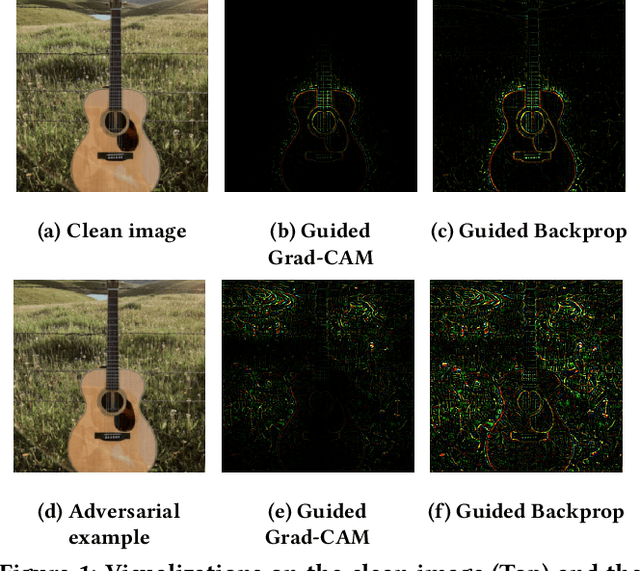
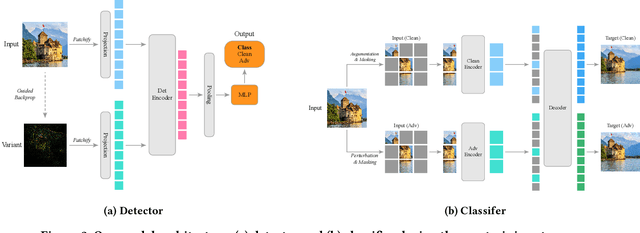
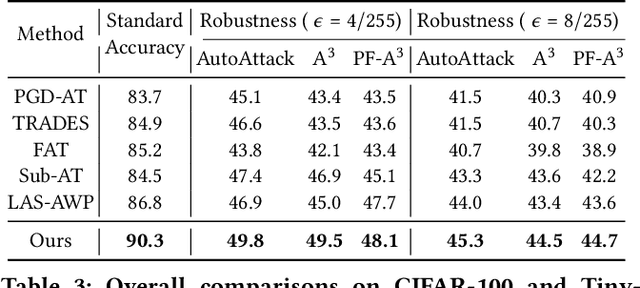
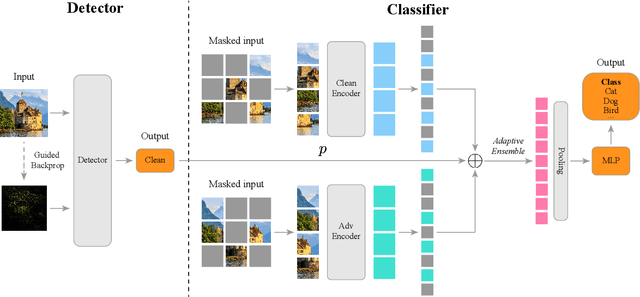
Abstract:Adversarial training (AT) can help improve the robustness of Vision Transformers (ViT) against adversarial attacks by intentionally injecting adversarial examples into the training data. However, this way of adversarial injection inevitably incurs standard accuracy degradation to some extent, thereby calling for a trade-off between standard accuracy and robustness. Besides, the prominent AT solutions are still vulnerable to adaptive attacks. To tackle such shortcomings, this paper proposes a novel ViT architecture, including a detector and a classifier bridged by our newly developed adaptive ensemble. Specifically, we empirically discover that detecting adversarial examples can benefit from the Guided Backpropagation technique. Driven by this discovery, a novel Multi-head Self-Attention (MSA) mechanism is introduced to enhance our detector to sniff adversarial examples. Then, a classifier with two encoders is employed for extracting visual representations respectively from clean images and adversarial examples, with our adaptive ensemble to adaptively adjust the proportion of visual representations from the two encoders for accurate classification. This design enables our ViT architecture to achieve a better trade-off between standard accuracy and robustness. Besides, our adaptive ensemble technique allows us to mask off a random subset of image patches within input data, boosting our ViT's robustness against adaptive attacks, while maintaining high standard accuracy. Experimental results exhibit that our ViT architecture, on CIFAR-10, achieves the best standard accuracy and adversarial robustness of 90.3% and 49.8%, respectively.
* 9 pages
FedNILM: Applying Federated Learning to NILM Applications at the Edge
Jun 07, 2021
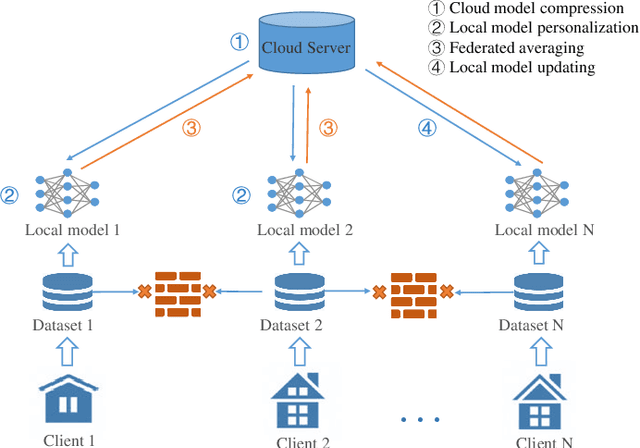

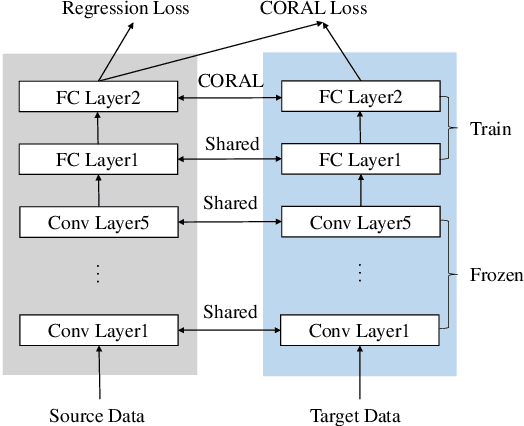
Abstract:Non-intrusive load monitoring (NILM) helps disaggregate the household's main electricity consumption to energy usages of individual appliances, thus greatly cutting down the cost in fine-grained household load monitoring. To address the arisen privacy concern in NILM applications, federated learning (FL) could be leveraged for NILM model training and sharing. When applying the FL paradigm in real-world NILM applications, however, we are faced with the challenges of edge resource restriction, edge model personalization and edge training data scarcity. In this paper we present FedNILM, a practical FL paradigm for NILM applications at the edge client. Specifically, FedNILM is designed to deliver privacy-preserving and personalized NILM services to large-scale edge clients, by leveraging i) secure data aggregation through federated learning, ii) efficient cloud model compression via filter pruning and multi-task learning, and iii) personalized edge model building with unsupervised transfer learning. Our experiments on real-world energy data show that, FedNILM is able to achieve personalized energy disaggregation with the state-of-the-art accuracy, while ensuring privacy preserving at the edge client.
 Add to Chrome
Add to Chrome Add to Firefox
Add to Firefox Add to Edge
Add to Edge